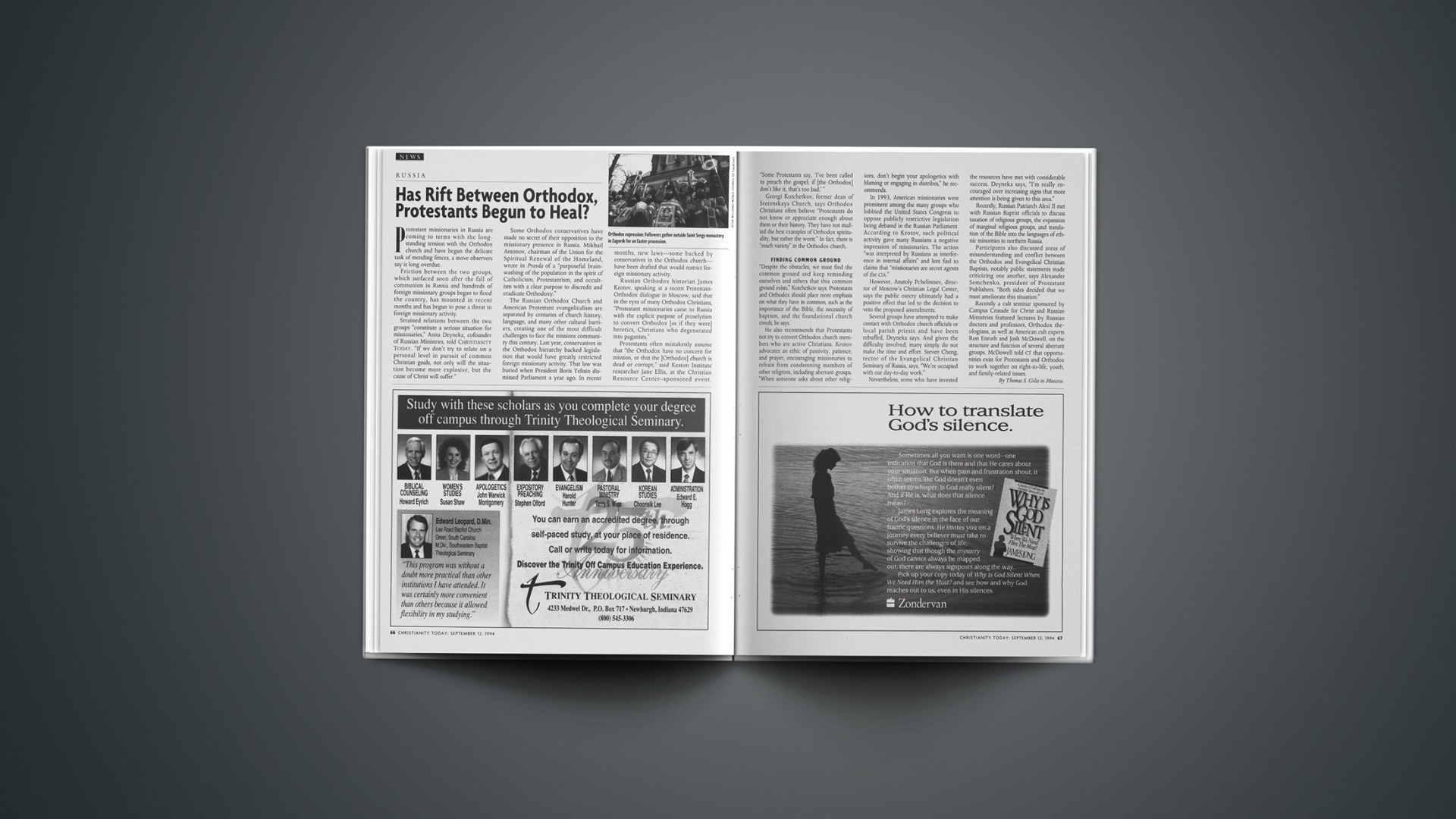Protestant missionaries in Russia are coming to terms with the long-standing tension with the Orthodox church and have begun the delicate task of mending fences, a move observers say is long overdue.
Friction between the two groups, which surfaced soon after the fall of communism in Russia and hundreds of foreign missionary groups began to flood the country, has mounted in recent months and has begun to pose a threat to foreign missionary activity.
Strained relations between the two groups “constitute a serious situation for missionaries,” Anita Deyneka, cofounder of Russian Ministries, told CHRISTIANITY TODAY. “If we don’t try to relate on a personal level in pursuit of common Christian goals, not only will the situation become more explosive, but the cause of Christ will suffer.”
Some Orthodox conservatives have made no secret of their opposition to the missionary presence in Russia. Mikhail Antonov, chairman of the Union for the Spiritual Renewal of the Homeland, wrote in Pravda of a “purposeful brainwashing of the population in the spirit of Catholicism, Protestantism, and occultism with a clear purpose to discredit and eradicate Orthodoxy.”
The Russian Orthodox Church and American Protestant evangelicalism are separated by centuries of church history, language, and many other cultural barriers, creating one of the most difficult challenges to face the missions community this century. Last year, conservatives in the Orthodox hierarchy backed legislation that would have greatly restricted foreign missionary activity. That law was buried when President Boris Yeltsin dismissed Parliament a year ago. In recent months, new laws—some backed by conservatives in the Orthodox church -have been drafted that would restrict foreign missionary activity.
Russian Orthodox historian James Krotov, speaking at a recent Protestant-Orthodox dialogue in Moscow, said that in the eyes of many Orthodox Christians, “Protestant missionaries came to Russia with the explicit purpose of proselytism to convert Orthodox [as if they were] heretics, Christians who degenerated into paganists.”
Protestants often mistakenly assume that “the Orthodox have no concern for mission, or that the [Orthodox] church is dead or corrupt,” said Keston Institute researcher Jane Ellis, at the Christian Resource Center-sponsored event.
“Some Protestants say, ‘I’ve been called to preach the gospel; if [the Orthodox] don’t like it, that’s too bad.'”
Georgi Kotchetkov, former dean of Sretenskaya Church, says Orthodox Christians often believe “Protestants do not know or appreciate enough about them or their history. They have not studied the best examples of Orthodox spirituality, but rather the worst.” In fact, there is “much variety” in the Orthodox church.
FINDING COMMON GROUND
“Despite the obstacles, we must find the common ground and keep reminding ourselves and others that this common ground exists,” Kotchetkov says. Protestants and Orthodox should place more emphasis on what they have in common, such as the importance of the Bible, the necessity of baptism, and the foundational church creeds, he says.
He also recommends that Protestants not try to convert Orthodox church members who are active Christians. Krotov advocates an ethic of passivity, patience, and prayer, encouraging missionaries to refrain from condemning members of other religions, including aberrant groups. “When someone asks about other religions, don’t begin your apologetics with blaming or engaging in diatribes,” he recommends.
In 1993, American missionaries were prominent among the many groups who lobbied the United States Congress to oppose publicly restrictive legislation being debated in the Russian Parliament. According to Krotov, such political activity gave many Russians a negative impression of missionaries. The action “was interpreted by Russians as interference in internal affairs” and lent fuel to claims that “missionaries are secret agents of the CIA.”
However, Anatoly Pchelintsev, director of Moscow’s Christian Legal Center, says the public outcry ultimately had a positive effect that led to the decision to veto the proposed amendments.
Several groups have attempted to make contact with Orthodox church officials or local parish priests and have been rebuffed, Deyneka says. And given the difficulty involved, many simply do not make the time and effort. Steven Cheng, rector of the Evangelical Christian Seminary of Russia, says, “We’re occupied with our day-to-day work.”
Nevertheless, some who have invested the resources have met with considerable success. Deyneka says, “I’m really encouraged over increasing signs that more attention is being given to this area.”
Recently, Russian Patriarch Alexi II met with Russian Baptist officials to discuss taxation of religious groups, the expansion of marginal religious groups, and translation of the Bible into the languages of ethnic minorities in northern Russia.
Participants also discussed areas of misunderstanding and conflict between the Orthodox and Evangelical Christian Baptists, notably public statements made criticizing one another, says Alexander Semchenko, president of Protestant Publishers. “Both sides decided that we must ameliorate this situation.”
Recently a cult seminar sponsored by Campus Crusade for Christ and Russian Ministries featured lectures by Russian doctors and professors, Orthodox theologians, as well as American cult experts Ron Enroth and Josh McDowell, on the structure and function of several aberrant groups. McDowell told CT that opportunities exist for Protestants and Orthodox to work together on right-to-life, youth, and family-related issues.
Copyright © 1994 Christianity Today. Click for reprint information.










